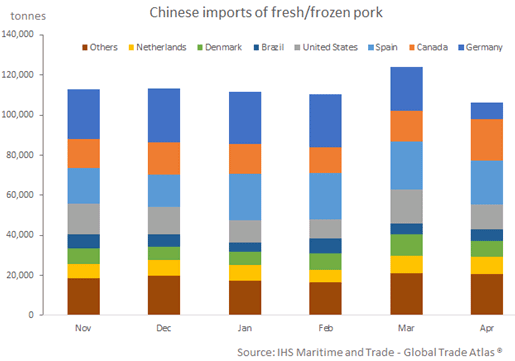



Germany to Resume Pig Exports to China
GERMANY - Germany had been the largest supplier of fresh and frozen pork to China and was also the second largest supplier of offal, reports Duncan Wyatt, lead analyst at AHDB.However, two major German processors, Tönnies and Böseler Goldschmaus, had their licenses to export to China suspended in mid-February although they have now received new authorisations to resume trade.
German export data shows that shipments of pork to this market more than halved in February and March as the interruptions for these companies took hold. Trade was down from nearly 21,000 tonnes in January, to 8,300 tonnes in February and 9,400 tonnes in March, although the reduction was not felt in China’s import statistics until April.
This situation left Spain as China’s largest supplier by volume (close to 21 per cent in April) having overtaken Germany in March. However, it would appear that the main beneficiary might have been Canada, as rapidly rising prices inside the EU have impaired other member states’ competitiveness on the global market.

Canada received a double boost from an interruption in German supplies and the reduced ability of other European nations to fill the gap, either through their lack of ability to respond on price, or a paucity of supplies for export.
Canadian exporters were able to increase volumes to China to 20,300 tonnes in April, 64 per cent more than the same month in 2016 and around 5,000 tonnes more than in March. Overall Canada did not fully replace the lack of German product, as China took in less pork in April, as supplies also fell slightly from the US and Denmark.
German offal exports to China also suffered during the suspension. German export data indicated shipments of only 9,000 tonnes in February and March compared with 24,000 tonnes in January. This was not reflected in Chinese import data until April with German trade only recorded at 5,800 tonnes. No other country stepped into the breach in this case, and overall imports fell from 104,400 tonnes in March to 88,200 tonnes in April.
The lifting of the restrictions should enable German trade to build up substantially again and improve market returns on the key German market, the largest in the EU. The extent to which trade returns to normal will partly depend on the competitiveness of German product both compared with both other EU exporters and global exporters.








